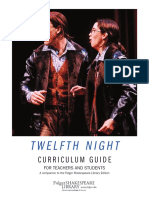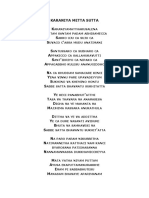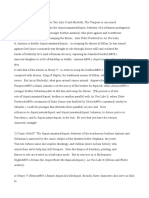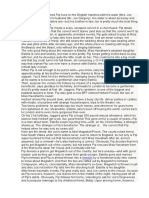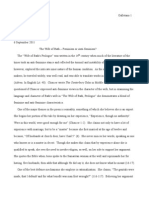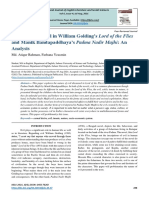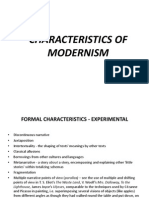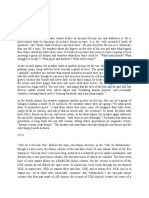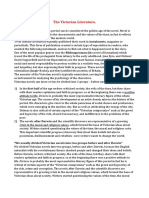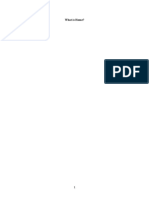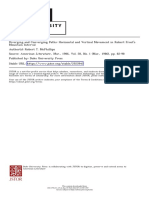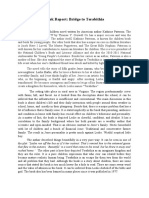100%(1)100% found this document useful (1 vote)
508 viewsMacbeth SQ
Macbeth SQ
Uploaded by
Radu KzoMacbeth explores different definitions of masculinity and manhood. Lady Macbeth questions Macbeth's manhood to manipulate him into committing regicide. Both equate manhood with violence and aggression, allowing order to descend into chaos. However, Macduff teaches a revised definition, telling Malcolm that true manhood involves feeling tragedy as well as disputing it. The play examines shifting views of gender roles and identity over its course.
Copyright:
© All Rights Reserved
Available Formats
Download as DOCX, PDF, TXT or read online from Scribd
Macbeth SQ
Macbeth SQ
Uploaded by
Radu Kzo100%(1)100% found this document useful (1 vote)
508 views2 pagesMacbeth explores different definitions of masculinity and manhood. Lady Macbeth questions Macbeth's manhood to manipulate him into committing regicide. Both equate manhood with violence and aggression, allowing order to descend into chaos. However, Macduff teaches a revised definition, telling Malcolm that true manhood involves feeling tragedy as well as disputing it. The play examines shifting views of gender roles and identity over its course.
Original Description:
Macbeth Study Questions
Copyright
© © All Rights Reserved
Available Formats
DOCX, PDF, TXT or read online from Scribd
Share this document
Did you find this document useful?
Is this content inappropriate?
Macbeth explores different definitions of masculinity and manhood. Lady Macbeth questions Macbeth's manhood to manipulate him into committing regicide. Both equate manhood with violence and aggression, allowing order to descend into chaos. However, Macduff teaches a revised definition, telling Malcolm that true manhood involves feeling tragedy as well as disputing it. The play examines shifting views of gender roles and identity over its course.
Copyright:
© All Rights Reserved
Available Formats
Download as DOCX, PDF, TXT or read online from Scribd
Download as docx, pdf, or txt
100%(1)100% found this document useful (1 vote)
508 views2 pagesMacbeth SQ
Macbeth SQ
Uploaded by
Radu KzoMacbeth explores different definitions of masculinity and manhood. Lady Macbeth questions Macbeth's manhood to manipulate him into committing regicide. Both equate manhood with violence and aggression, allowing order to descend into chaos. However, Macduff teaches a revised definition, telling Malcolm that true manhood involves feeling tragedy as well as disputing it. The play examines shifting views of gender roles and identity over its course.
Copyright:
© All Rights Reserved
Available Formats
Download as DOCX, PDF, TXT or read online from Scribd
Download as docx, pdf, or txt
You are on page 1of 2
Alina-Gabriela David
Anul 3, Grupa En-Sp
Macbeth
1) One of the Aristotelian principles of tragedy is that the hero's downfall is caused by a moral weakness
or flaw that inexorably leads him to his tragic destiny. In this respect, can Macbeth be seen as an
Aristotelian tragedy? What basic human flaws or weaknesses does Macbeth display? How do they
contribute to his downfall?
Macbeth is an example of the terrible effects that ambition and guilt can have on a man who lacks
strength of character. We can consider him as irrevocably evil. Althoug he is a great warrior, is ill
equipped for the psychic consequences of crime.He fluctuates between fits of fevered action, in which he
plots a series of murders to secure his throne, and moments of terrible guilt (as when Banquos ghost
appears) and absolute pessimism (after his wifes death, when he seems to succumb to despair). These
fluctuations reflect the tragic tension within Macbeth: he is at once too ambitious to allow his conscience
to stop him from murdering his way to the top and too conscientious to be happy with himself as a
murderer.
2) The three witches have been seen as figures of the Greek Moirae (Latin Parcae), or Fates, who
respectively spin, measure out and cut the thread of human life. Note how the scenes with the "weird
sisters" (Old Eng. wyrd=Fate) punctuate and structure the play. To what extent do their predictions
dictate events? Are their prophecies binding? Is Macbeth trapped by destiny, a victim of fate, or does he
have free will? How do we know? Note specific scenes and speeches that justify your point of view.
The witches play the role of prophet because they predicted predicted that Macbeth will soon
become the Thane of Cawdor and eventually King of Scotland. The moment he becomes aware of the
fact that the king has conferred upon him the title he remembers about the prophecy which means that
the witches influenced him and somehow triggerd in him the idea of murdering the present king. Also, he
remembers the witches prophecy regarding Banquo; so he decides to hire a group of murderers to kill
Banquo and his son Fleance.
3) Banquo is a foil
1
to Macbeth in that both are the subject of prophecies concerning the future kingship
of Scotland, but they react to these prophecies differently. How does each respond to his encounter with
the witches? Are there key differences? Why does Shakespeare include two sets of prophecies? What
is the effect of this juxtaposition?
Banquo showed a different understanding of what the witches say over how Macbeth thought. In
the first act Banquo was cautious regarding what the witches said, as Macbeth thought it would be
marvelous. The first thing Banquo says about the prophecies when he sees that the first prophecy
(Macbeth will be Thane of Cawdor) come true is that that trusted home / Might yet enkindle you unto the
crown, / Besides the Thane of Cawdor. But 'tis strange; / And oftentimes, to win us to our harm, / The
instruments of darkness tell us truths, / Win us with honest trifles, to betray's / In deepest consequence .
The main difference between the two is that Banquo is more cautious of what the witches said, as
Macbeth is in a lot more wonder, than wondering if he could become King. The reason why Shakespeare
made two prophecies is based on the juxtaposition between Macbeth and Banquo: the first one is
1
Definition: a dramatic foil is a minor character that resembles or is in parallel circumstances to a central figure
in the play. Foils are similar enough to the main character(s) to provide a useful basis of comparison, but different
enough that the comparison is meaningful: they enhance our understanding of the main character's personality
traits or actions.
Alina-Gabriela David
Anul 3, Grupa En-Sp
ambitious and resentful, while the second one is more cautious and careful of the situation at hand, which
makes them great counterparts to each other.
4) Apart from the Weird Sisters, there are only two significant female characters in the play.
Compare/contrast Lady Macbeth and LadyMacduff. Are they foils to one another? Why or why not?
What do they have in common? How do they differ? Lady Macduff is defined principally as a mother,
while Lady Macbeth is apparently childless (see IV.iii.216). Nonetheless, Lady Macbeth says that she
has "given suck, and [knows]/ How tender 'tis to love the babe that milks [her]" (I.vii.54-55). Can that
shared experience of motherhood be seen as a bond between the two women? Does Lady Macbeth
share the blame for Lady Macduff's murder? Does she approve of her husband's actions? Before she
dies, Lady Macduff complains of her husband's "unnatural" behavior in abandoning wife and children
(IV.ii.9). Is her anger justified?
On one hand, Lady Macbeth is a very strong character. When she is introduced, she is already
plotting Duncans murder, and she appears stronger than her husband. She seems fully aware of this and
knows that she will have to push Macbeth into committing murder. Her thoughness makes Macbeth seem
weaker in the sense that he sees her as a masculine soul inhabiting a female body.Another influence that
Lady Macbeth has upon her husband is that of manipulation.
On the other hand Lady Macduff is a minor character. She is presented as a wife and a mother, a
wife who is annoyed over her husband's apparently irresponsible desertion of the family, and a mother
who is cocerned about her son's safety in the absence of the father. Thus, she is totally opposed to Lady
Macbeth.
5) In some respects, Macbeth is a meditation upon "manhood." It explores "natural" and "unnatural"
gender behavior, offering varying views on what constitutes real "manhood." Note statements throughout
the play that deal with "manliness," masculine identity, being a man, etc. How do the various characters
in the play define "manhood"? How do these definitions shift over the course of the play?
Lady Macbeth manipulates her husband by questioning his manhood, wishing herself to be
unsexed, and does not contradict Macbeth when he says that a woman like her should give birth only to
boys. In the same manner that Lady Macbeth goads her husband on to murder, Macbeth provokes the
assassins he hires to murder Banquo by questioning their manhood. Such acts show that both Macbeth
and Lady Macbeth equate masculinity with naked aggression; whenever they discuss manhood, violence
follows. Their understanding of manhood allows the political order depicted in the play to descend into
chaos.
The play does put forth a revised and less destructive definition of manhood. In the scene where Macduff
learns of the murders of his wife and child, Malcolm consoles him by encouraging him to take the news in
manly fashion, by seeking revenge upon Macbeth. Macduff shows the young heir apparent that he has
a mistaken understanding of masculinity. To Malcolms suggestion, Dispute it like a man, Macduff
replies, I shall do so. But I must also feel it as a man (IV.iii.221223).
You might also like
- The Stars and The Stones PDFDocument214 pagesThe Stars and The Stones PDFkbalazs100% (10)
- English Literature (17Th and 18Th Centuries) : Dunărea de Jos" University of Galati Faculty of LettersDocument6 pagesEnglish Literature (17Th and 18Th Centuries) : Dunărea de Jos" University of Galati Faculty of LettersfafaNo ratings yet
- A Handmaid's TaleDocument5 pagesA Handmaid's Talepriteegandhanaik_377No ratings yet
- Art and Nature in The TempestDocument18 pagesArt and Nature in The TempestInès AmouraNo ratings yet
- The Function of PilgrimageDocument3 pagesThe Function of PilgrimageМихаица Николае Дину75% (4)
- Twelfth Night: Curriculum GuideDocument19 pagesTwelfth Night: Curriculum GuideEric Ellul100% (1)
- Karaniya Metta SuttaDocument4 pagesKaraniya Metta SuttaHardy LimNo ratings yet
- Lit Eng RaspunsuriDocument8 pagesLit Eng RaspunsuriAndreeaFlorentinaNo ratings yet
- Pr10 Types of Forming WordsDocument56 pagesPr10 Types of Forming Wordswendy nguNo ratings yet
- Absalom, Absalom! Is Considered To Be One of Faulkner's Most Difficult Novels Because ofDocument3 pagesAbsalom, Absalom! Is Considered To Be One of Faulkner's Most Difficult Novels Because ofGeanina PopescuNo ratings yet
- Summary Lecture EnglishDocument3 pagesSummary Lecture EnglishSerenaStNo ratings yet
- MacbethfinalpaperDocument6 pagesMacbethfinalpaperapi-276566444No ratings yet
- As I Lay Dying%Document21 pagesAs I Lay Dying%fadwaNo ratings yet
- Choose 2 Questions For Each Play and Write The Answers in Your Study PortfolioDocument9 pagesChoose 2 Questions For Each Play and Write The Answers in Your Study PortfolioMădălina GreensNo ratings yet
- 33 A DobrinescuDocument8 pages33 A DobrinescuCecilia Trandafir100% (1)
- Great ExpectationsDocument5 pagesGreat ExpectationsAnastasia MoraruNo ratings yet
- The Wife of BathDocument1 pageThe Wife of BathSilvia ChumbitaNo ratings yet
- The 20th Century LiteratureDocument2 pagesThe 20th Century LiteraturePatricia BaldonedoNo ratings yet
- A Midsummer NightDocument4 pagesA Midsummer NightMustafa AliNo ratings yet
- W. B. Yeats and Private Mythology PDFDocument2 pagesW. B. Yeats and Private Mythology PDFGabriela ScaeteNo ratings yet
- Fragments From American Literature: Henry James Realism and HumorDocument3 pagesFragments From American Literature: Henry James Realism and HumorFruzsee89No ratings yet
- Wife of Bath Forum EssayDocument4 pagesWife of Bath Forum EssaySharron GalletanoNo ratings yet
- Fahrenheit 451Document3 pagesFahrenheit 451api-355437549No ratings yet
- The Tale of The Wife of Bath: A Tale of Personal TransformationDocument9 pagesThe Tale of The Wife of Bath: A Tale of Personal TransformationGuy Duperreault100% (1)
- How Thomas Hardy Unfolds His Tragic Consciousness Technically in Tess of The D'UrbervillesDocument9 pagesHow Thomas Hardy Unfolds His Tragic Consciousness Technically in Tess of The D'UrbervillesIJELS Research JournalNo ratings yet
- Further Practice 2Document4 pagesFurther Practice 2Minh Huyền DươngNo ratings yet
- The Destructiveness of A Love That Never ChangesDocument5 pagesThe Destructiveness of A Love That Never ChangesDzul Azraai Dzulkarnain100% (1)
- THE TRAGEDY OF HAMLET, PRINCE OF DENMARK by William Shakespeare PDFDocument68 pagesTHE TRAGEDY OF HAMLET, PRINCE OF DENMARK by William Shakespeare PDFAnonymous egHsconeNo ratings yet
- Hamlet As A Revenge Tragedy 3Document3 pagesHamlet As A Revenge Tragedy 3xbabaxNo ratings yet
- Narratology in Wuthering HeightsDocument126 pagesNarratology in Wuthering HeightsParaic Doyle100% (2)
- The Nature of Evil in William Golding's Lord of The Flies and Manik Bandapaddhaya's Padma Nadir Majhi: An AnalysisDocument6 pagesThe Nature of Evil in William Golding's Lord of The Flies and Manik Bandapaddhaya's Padma Nadir Majhi: An AnalysisIJELS Research JournalNo ratings yet
- Seminar Journal Questions SMDocument11 pagesSeminar Journal Questions SMSerena Maschio100% (1)
- DeorDocument5 pagesDeorhnuturNo ratings yet
- PraislerDocument8 pagesPraislerCarmen Maria Fluturaş100% (1)
- Mastering MacbethDocument42 pagesMastering Macbethfdzgw4mnvkNo ratings yet
- The Use of Irony in Gulliver's TravelsDocument2 pagesThe Use of Irony in Gulliver's TravelsImran AliNo ratings yet
- Characteristics of ModernismDocument17 pagesCharacteristics of ModernismThais PopaNo ratings yet
- Suport Curs LiteraturaDocument156 pagesSuport Curs LiteraturaSimonaVătafuNo ratings yet
- Revenge in HamletDocument3 pagesRevenge in HamletdjoiajgNo ratings yet
- Lucia Opreanu - INTERTEXTUAL LIVES: REVERSE MIMESIS, SANITY AND SURVIVALDocument10 pagesLucia Opreanu - INTERTEXTUAL LIVES: REVERSE MIMESIS, SANITY AND SURVIVALtan digioNo ratings yet
- Tess - A Pure Woman or A Fallen Woman? The Portrayal of Gender Issues in Tess of The D'Urbervilles: A Feminist ApproachDocument6 pagesTess - A Pure Woman or A Fallen Woman? The Portrayal of Gender Issues in Tess of The D'Urbervilles: A Feminist ApproachAiman TybaNo ratings yet
- Seminars 3&4 - That Complements, SOT, SubjunctivesDocument6 pagesSeminars 3&4 - That Complements, SOT, SubjunctivesAndrei BobeicăNo ratings yet
- Summary French LieutenantDocument2 pagesSummary French LieutenantMoise Bianca RoxanaNo ratings yet
- Subiecte - LEC, An 1 Sem.2Document8 pagesSubiecte - LEC, An 1 Sem.2Iulia OnofreiNo ratings yet
- D.H.lawrence Sons Ans Lovers (Comentariu)Document16 pagesD.H.lawrence Sons Ans Lovers (Comentariu)Dumitriţa ChiricaNo ratings yet
- Shakespeare Research Paper PDFDocument11 pagesShakespeare Research Paper PDFS S Janjua67% (3)
- Comparative Analysis of Robinson Crusoe and FoeDocument9 pagesComparative Analysis of Robinson Crusoe and FoeAdriana AadrianaaNo ratings yet
- Shaw's Portrayal of Cleopatra' (Source: Caesar and Cleopatra' by George Bernard Shaw)Document8 pagesShaw's Portrayal of Cleopatra' (Source: Caesar and Cleopatra' by George Bernard Shaw)Denisa NedelcuNo ratings yet
- Uncle Toms Cabin AnalysisDocument3 pagesUncle Toms Cabin AnalysisJosh OngNo ratings yet
- Main Themes in Scott Fitzgerald's Novel The Great GatsbyDocument4 pagesMain Themes in Scott Fitzgerald's Novel The Great GatsbyAndreea VilceanuNo ratings yet
- Virginia WoolfDocument3 pagesVirginia WoolfKhawar ShahzadNo ratings yet
- Thomas EdisonDocument5 pagesThomas EdisonCarlo Fernando PadinNo ratings yet
- Gender Translation Theory Applied On Madame BovaryDocument14 pagesGender Translation Theory Applied On Madame BovaryMeditatii Limba Engleza BufteaNo ratings yet
- Ode On A Grecian UrnDocument3 pagesOde On A Grecian UrneἈλέξανδροςNo ratings yet
- The Victorian LiteratureDocument2 pagesThe Victorian LiteraturegiuliaNo ratings yet
- The Role of Women in The Aeneid: Anna Phillips-BrownDocument5 pagesThe Role of Women in The Aeneid: Anna Phillips-BrownAnnaPhillips-BrownNo ratings yet
- Students: Oprea Daniela Zănoagă Bianca Group: Romanian-English Year: III Faculty of LettersDocument10 pagesStudents: Oprea Daniela Zănoagă Bianca Group: Romanian-English Year: III Faculty of LettersMihaela Miha TurleaNo ratings yet
- Literary Analysis George Bernard Shaw's Literary Technique in PygmalionDocument1 pageLiterary Analysis George Bernard Shaw's Literary Technique in PygmalionMery_7No ratings yet
- Thomas Hardy, Tess of The D'urbervillesDocument3 pagesThomas Hardy, Tess of The D'urbervillesTrandafir Dorin0% (1)
- Study Guide to Of Mice and Men and Other Works by John SteinbeckFrom EverandStudy Guide to Of Mice and Men and Other Works by John SteinbeckNo ratings yet
- Act Summary QuestionsDocument7 pagesAct Summary Questionskcafaro59No ratings yet
- MoonstoneDocument327 pagesMoonstonekrystalklearNo ratings yet
- The Great Commission ADDITION of Matthew 28Document7 pagesThe Great Commission ADDITION of Matthew 28EstebanNo ratings yet
- Presentations Introducing YourselfDocument3 pagesPresentations Introducing YourselfAndjela PopovicNo ratings yet
- Reading and Writing Week 1-d1Document13 pagesReading and Writing Week 1-d1kristine remolloNo ratings yet
- Snow White and The Seven Dwarfs (1937)Document22 pagesSnow White and The Seven Dwarfs (1937)William KirbyNo ratings yet
- Broj Prijave Šifra Učenika Škola 1 2 3 4 5Document4 pagesBroj Prijave Šifra Učenika Škola 1 2 3 4 5Danijela KvasNo ratings yet
- R. K. NarayanDocument9 pagesR. K. NarayanCutypie Dipali SinghNo ratings yet
- 150 Word StudiesDocument304 pages150 Word StudiesKarthik V KalyaniNo ratings yet
- Active PassiveDocument3 pagesActive PassiveJr FloresNo ratings yet
- Poets and PancakesDocument3 pagesPoets and Pancakestext2kagajNo ratings yet
- Where Is HomeDocument5 pagesWhere Is Homeca5subin13No ratings yet
- Exploring The World of English Syed Saadat Ali ShahDocument214 pagesExploring The World of English Syed Saadat Ali ShahRizwan Ahmed100% (1)
- Fun With Fluency LessonDocument3 pagesFun With Fluency Lessonapi-293903807No ratings yet
- Pri Uptet 2016 PDFDocument3 pagesPri Uptet 2016 PDFRipusudan Chauhan RipsNo ratings yet
- ClimaxDocument5 pagesClimaxnijheerNo ratings yet
- Fall 2016 Cat WebDocument40 pagesFall 2016 Cat WebsiyathuNo ratings yet
- Giles Whiteley - Schelling's Reception in Nineteenth-Century British Literature - 2018Document328 pagesGiles Whiteley - Schelling's Reception in Nineteenth-Century British Literature - 2018GeorgeTshagharian100% (2)
- Part 3 Mike Guide For EnglishDocument219 pagesPart 3 Mike Guide For EnglishMuhammad TahaNo ratings yet
- ĐỀ GK1Document5 pagesĐỀ GK1Võ Thị Như ÝNo ratings yet
- Robert T. McPhillips - Diverging and Converging Paths - Horizontal and Vertical Movement in Robert Frost'sDocument18 pagesRobert T. McPhillips - Diverging and Converging Paths - Horizontal and Vertical Movement in Robert Frost'sPratyusha BhaskarNo ratings yet
- A Brave New World Study GuideDocument6 pagesA Brave New World Study GuideJohn DoNo ratings yet
- Figures of SpeechDocument55 pagesFigures of SpeechJohn Paul HabladoNo ratings yet
- Soon May The Wellerman ComeDocument5 pagesSoon May The Wellerman Comejennybg100% (1)
- Ernest Hemingway PowerPointDocument10 pagesErnest Hemingway PowerPointmissseesNo ratings yet
- Bad Girl Online LyricsDocument2 pagesBad Girl Online LyricsSarah ZeghrabaNo ratings yet
- Book Report Bridge To TerabithiaDocument2 pagesBook Report Bridge To TerabithiaannailaNo ratings yet
- Rahul Chandra Khan, 22, AECC101Document11 pagesRahul Chandra Khan, 22, AECC101ratuldutta5631No ratings yet






